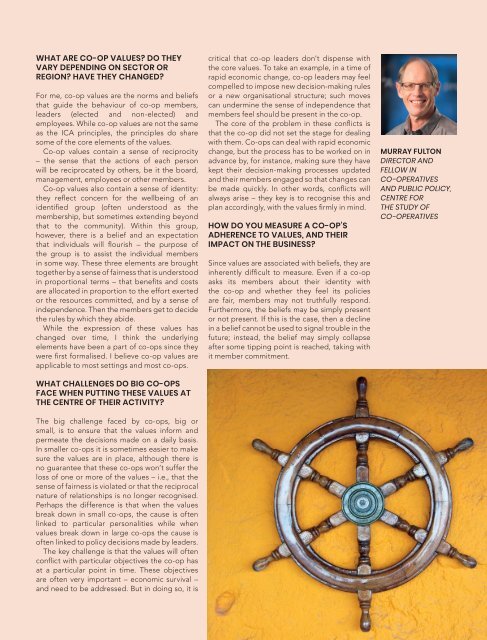SEPTEMBER 2018
The September edition of Co-op News looks at how co-ops cab maintain co-operative values and principles while operating in competitive markets and how this can be a challenge for large co-ops. We examine current research into what influences a co-op’s take on the traditional values of self-help, self-responsibility, democracy, equality, equity and solidarity.
The September edition of Co-op News looks at how co-ops cab maintain co-operative values and principles while operating in competitive markets and how this can be a challenge for large co-ops. We examine current research into what influences a co-op’s take on the traditional values of self-help, self-responsibility, democracy, equality, equity and solidarity.
You also want an ePaper? Increase the reach of your titles
YUMPU automatically turns print PDFs into web optimized ePapers that Google loves.
WHAT ARE CO-OP VALUES? DO THEY<br />
VARY DEPENDING ON SECTOR OR<br />
REGION? HAVE THEY CHANGED?<br />
For me, co-op values are the norms and beliefs<br />
that guide the behaviour of co-op members,<br />
leaders (elected and non-elected) and<br />
employees. While co-op values are not the same<br />
as the ICA principles, the principles do share<br />
some of the core elements of the values.<br />
Co-op values contain a sense of reciprocity<br />
– the sense that the actions of each person<br />
will be reciprocated by others, be it the board,<br />
management, employees or other members.<br />
Co-op values also contain a sense of identity:<br />
they reflect concern for the wellbeing of an<br />
identified group (often understood as the<br />
membership, but sometimes extending beyond<br />
that to the community). Within this group,<br />
however, there is a belief and an expectation<br />
that individuals will flourish – the purpose of<br />
the group is to assist the individual members<br />
in some way. These three elements are brought<br />
together by a sense of fairness that is understood<br />
in proportional terms – that benefits and costs<br />
are allocated in proportion to the effort exerted<br />
or the resources committed, and by a sense of<br />
independence. Then the members get to decide<br />
the rules by which they abide.<br />
While the expression of these values has<br />
changed over time, I think the underlying<br />
elements have been a part of co-ops since they<br />
were first formalised. I believe co-op values are<br />
applicable to most settings and most co-ops.<br />
WHAT CHALLENGES DO BIG CO-OPS<br />
FACE WHEN PUTTING THESE VALUES AT<br />
THE CENTRE OF THEIR ACTIVITY?<br />
The big challenge faced by co-ops, big or<br />
small, is to ensure that the values inform and<br />
permeate the decisions made on a daily basis.<br />
In smaller co-ops it is sometimes easier to make<br />
sure the values are in place, although there is<br />
no guarantee that these co-ops won’t suffer the<br />
loss of one or more of the values – i.e., that the<br />
sense of fairness is violated or that the reciprocal<br />
nature of relationships is no longer recognised.<br />
Perhaps the difference is that when the values<br />
break down in small co-ops, the cause is often<br />
linked to particular personalities while when<br />
values break down in large co-ops the cause is<br />
often linked to policy decisions made by leaders.<br />
The key challenge is that the values will often<br />
conflict with particular objectives the co-op has<br />
at a particular point in time. These objectives<br />
are often very important – economic survival –<br />
and need to be addressed. But in doing so, it is<br />
critical that co-op leaders don’t dispense with<br />
the core values. To take an example, in a time of<br />
rapid economic change, co-op leaders may feel<br />
compelled to impose new decision-making rules<br />
or a new organisational structure; such moves<br />
can undermine the sense of independence that<br />
members feel should be present in the co-op.<br />
The core of the problem in these conflicts is<br />
that the co-op did not set the stage for dealing<br />
with them. Co-ops can deal with rapid economic<br />
change, but the process has to be worked on in<br />
advance by, for instance, making sure they have<br />
kept their decision-making processes updated<br />
and their members engaged so that changes can<br />
be made quickly. In other words, conflicts will<br />
always arise – they key is to recognise this and<br />
plan accordingly, with the values firmly in mind.<br />
HOW DO YOU MEASURE A CO-OP’S<br />
ADHERENCE TO VALUES, AND THEIR<br />
IMPACT ON THE BUSINESS?<br />
Since values are associated with beliefs, they are<br />
inherently difficult to measure. Even if a co-op<br />
asks its members about their identity with<br />
the co-op and whether they feel its policies<br />
are fair, members may not truthfully respond.<br />
Furthermore, the beliefs may be simply present<br />
or not present. If this is the case, then a decline<br />
in a belief cannot be used to signal trouble in the<br />
future; instead, the belief may simply collapse<br />
after some tipping point is reached, taking with<br />
it member commitment.<br />
MURRAY FULTON<br />
DIRECTOR AND<br />
FELLOW IN<br />
CO-OPERATIVES<br />
AND PUBLIC POLICY,<br />
CENTRE FOR<br />
THE STUDY OF<br />
CO-OPERATIVES


















